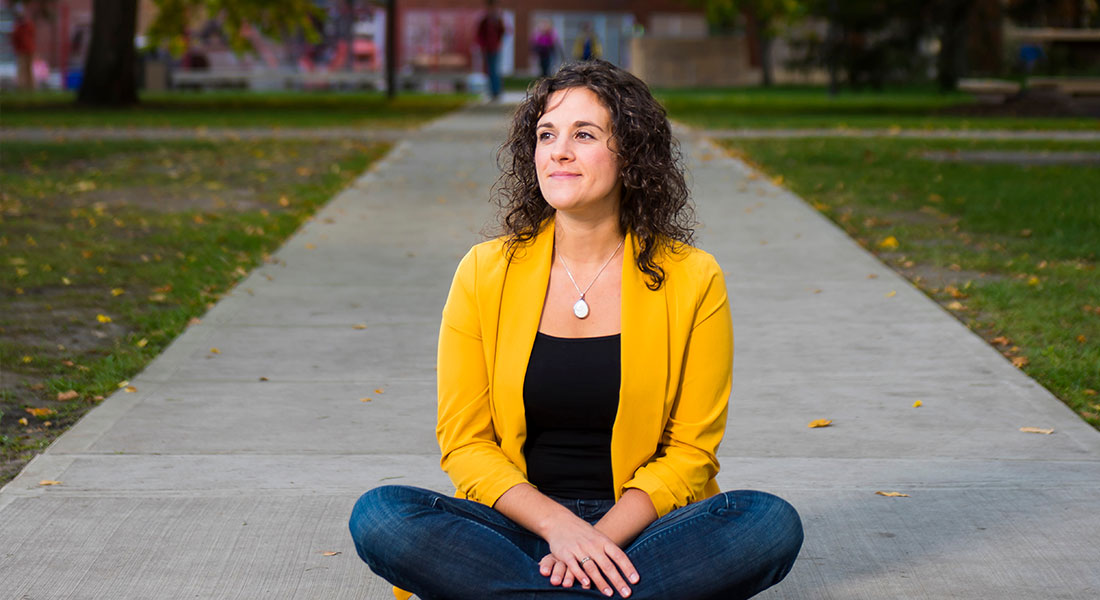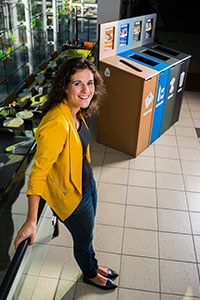
Shannon Leblanc ('07 BSc, '11 MSc) leads the way to sustainability success.
Shannon Leblanc's path to a science education was typical for a curious kid.
She always questioned why things work the way they do, encouraged by parents who stimulated an interest in the natural world. She followed a science-focused enrichment program in high school, and eventually enrolled at her local university. But once she arrived at the University of Alberta, her journey turned into anything but typical. Through many twists, Leblanc focused divergent interests into an honours degree in genetics and a Master's degree in which she examined stress response pathways in E. coli. Eventually she pursued a personal passion and volunteer experience to a career in sustainability, where she is now proudly helping her alma mater become a more sustainable ecosystem.
Leblanc started out in a general science degree with a focus on biology, picking up on her childhood fascination with marine life inspired by sailing trips with her British Columbian mother. She was also interested in genetics and forensics. Half-way through her undergraduate journey, she found herself wanting to specialize. "I was looking at something that piqued my interest," says Leblanc. "I did a little more digging and realized that genetics was something I found really fascinating and could fit with the forensics component-it could even fit with many other science areas."
She cut her lab teeth working for three of her four undergraduate summers as an NSERC student in various labs. It was this experience that connected her with Tracy Raivio (biological sciences), who would become her honours project supervisor, work that become the eventual basis for Leblanc's masters project. "Tracy and I had a really good relationship. She was really supportive and encouraging. She was a really great supervisor. She's one of the reasons I stuck around doing what I was doing. It was really exciting. I was learning research and critical thinking skills, and those have become so useful to me."
After completing her honours degree in genetics in 2007, Leblanc worked as Raivio's lab tech for a, which gave the former an opportunity to solidify her desire to pursue graduate studies. She earned a Julie Payette NSERC scholarship for her first year, an experience she credits for allowing her to dive in and focus on her coursework. However, Leblanc says she equally loved TA'ing during her second year. "It's a really cool iterative process to guide a group of 75 students through scientific writing [in the Biology 107 course on science writing], how to cite, how to write, going through peer review with a chance to go back and write again."
"You don't have deadlines as clearly laid out for you, you don't have assignments due. You're really responsible for your own work."
Like so many students who make the leap from undergrad to graduate studies, Leblanc found that the journey forced her to not only think more deeply but also to manage her time in a completely different way. "You don't have deadlines as clearly laid out for you, you don't have assignments due. You're really responsible for your own work." A foreshadowing of things to come in her career.
Leblanc said the transition to graduate work was eased by Raivio's support. "Tracy was a little more big-picture oriented, encouraging us to focus on the big questions. It gave those of us in her lab an opportunity to manage our time and set some of our own goals, which was a really good skill and definitely helps in my own professional life now."
Leblanc's thesis work focused on stress response pathways in E. coli, bacteria that use two component signal transduction systems to sense changes or stressors in their environment, whether chemical compounds, other organisms or proteins, or a human host. Though the pathogenic strains of E. coli frequently get a bad wrap in the media, there is a normal strain that lives in our guts all the time as part of our microbiota. Raivio's lab focuses on how these pathways function from a genetic perspective.
Developing a sustainability mindset on campus
Interested in expanding her own perspective, Leblanc started volunteering during her first year of her master's when one of her labmates' partners was leading an initiative to lobby the university to start a formal sustainability office. Leblanc's efforts were focused on executing events and encouraging people to volunteer for the campus sustainability coalition. Highlights included a pedal-powered "party with a purpose".
"It got me fired up. It took me back to my environmental interest. It got my passion going for this world of sustainability that had always been a personal value but had never been something that I pursued. I rediscovered that and saw there was some tangible work going on right here on campus."
Through her volunteer experiences she met several people working in the early days of the sustainability initiative on campus, what would eventually become the Office of Sustainability. Leblanc now works closely with this office in her role as sustainability coordinator with Energy Management and Sustainable Operations.
"It was a bit of a leap of faith on their part to hire me. I had worked with them as a student volunteer, I had a master's, I was educated but not in environmental sciences, and my project management work was all volunteer work. They knew I was capable, but it was definitely a risk for them. I was new and had a lot to learn. It was exciting. I was given validation that this could be a real job and potentially a career."
Leblanc credits her experience as a science student as helping her navigate a steep learning curve and says that the collegial environment she experienced in the Raivio lab helped prepare her for working as part of a larger team.
She's pleased by the progress the U of A has made in sustainability since her time as a volunteer in the early lobbying days and just this past July, she celebrated her own milestone working for five years to help drive those changes on campus.
"There's a higher awareness of sustainability on campus now than when I started. That goes for students and staff. There is a greater understanding not just for environmental sustainability-things like recycling and energy systems-but there's also a bigger conversation happening about bigger aspects of sustainability," says Leblanc, citing social sustainability and the people side as examples.
"How are the people of the university doing? Are they happy? Are they healthy? Are they thriving? Are they able to access education here? Do we have diverse people here, and are we encouraging that? There's a bit of a broadening of that conversation as that awareness and understanding has grown."
Leblanc outlines the three pillars of sustainability as environment, economy, and society, or the social side. Inspired by her graduate work, she approaches the three as an ecosystem and says that in order to have a sustainable system, all three need to work together.
Like any good scientist, Leblanc is focused on how a piece of the puzzle fits within the larger whole and spends her time focused on sustainable campus operations. She and her team have spent the last two years redesigning a waste diversion system with a zero-waste approach for campus, now in the process of implementation.
Though zero-waste is meant to be aspirational, the U of A is on target to achieve 90 per cent waste diversion by 2020.
"We compared what we were doing to how things could be if we captured more organics and recyclables to reduce the amount of waste." The end result is four-stream waste bins-organics, recyclables, mixed paper, and landfill-that are popping up all over campus.
Though zero-waste is meant to be aspirational, the U of A is targeted to achieve 90 per cent waste diversion by 2020. With current waste diversion on campus sitting at 55 per cent, it's an aggressive goal. Though Leblanc acknowledges it's a big leap, working with a dedicated team, she's up for the challenge. She also recently helped draft a reduction plan following the U of A's greenhouse gas inventory. "It puts me back in a research and teaching mindset. You're always learning. And none of it is done in isolation."
"You learn to not just take everything at face value, to dig deeper and question everything. I understand how to ask a question and how to go about trying to find a reasonable and evidence-based answer. Just because it's status quo and you've been doing it a certain way for a long time doesn't mean it's the best way to do things.
In it all, her commitment to her journey has never wavered. She credits her education and grounding in the scientific method as setting her up for career success.
"You learn to not just take everything at face value, to dig deeper and question everything. I understand how to ask a question and how to go about trying to find a reasonable and evidence-based answer. Just because it's status quo and you've been doing it a certain way for a long time doesn't mean it's the best way to do things. Applying a scientific mindset to my work has been really valuable to me. Especially in an operational setting where you are examining systems similarly. It is not the same systems, but the approach is similar, looking for interconnections in the system, looking for leverage points, and trying to examine how changing one thing might make the system work better or in your favour or, in the case of sustainability, have a lower environmental impact."
Leblanc talks about the importance of staying grounded and true to yourself throughout life's journey and advocates for finding a "home base" from which to safely explore.
"Along with following my passion and trusting my gut, I've always liked to have a niche. It doesn't mean it's the only place I focus, but it's kind of like home base. Tracy's lab gave me that, the Faculty of Science gave me that having mentors and somewhere to explore from. Whether you're in science or a professional setting like mine, there's always going to be challenge. There's always going to be stress. It's not easy, but you have to be intentional about it. And you have to trust your gut." After all, as Leblanc quips, it's full of good bacteria.
